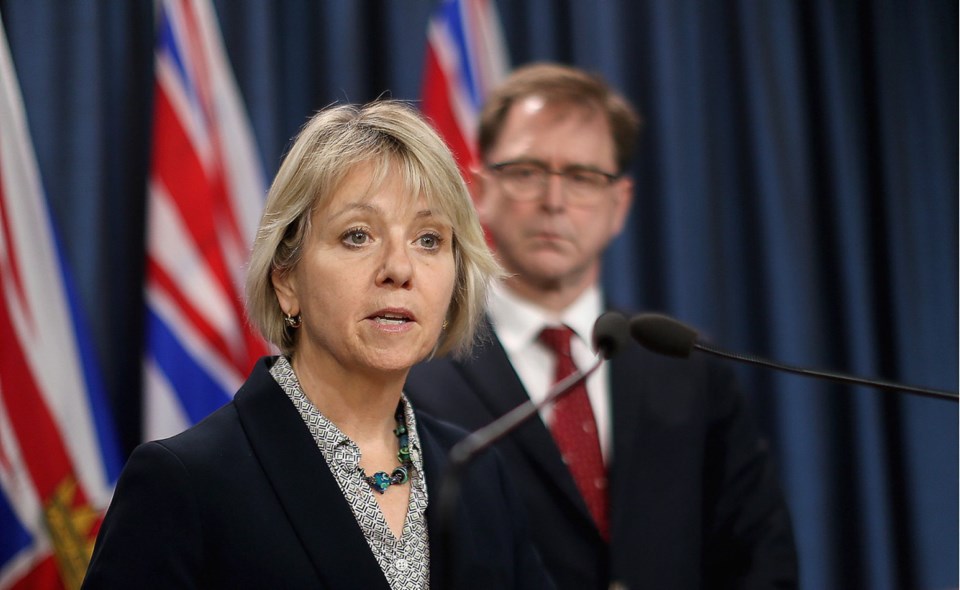Two senior citizens in hospital on Vancouver Island have died of COVID-19, the Island’s first deaths related to the global pandemic.
B.C. provincial health officer Dr. Bonnie Henry announced six new deaths for a total of 31 in the province during a news conference at the B.C. legislature on Thursday.
Both of the deceased on the Island were men, one in his 80s, the other in his 90s. Both had underlying health issues and died in hospital.
“Obviously, our condolences again to the families, the care providers, and the community who will be missing these additional people,” Henry said.
B.C. Health Minister Adrian Dix said “on this very sad day” he, too, wanted to extend his empathy to the loved ones of “every single person” who has died.
“We know what kind of day this is for their families and we want to express our condolences to their family, to their caregivers, for their friends in their communities,” Dix said.
Among the other new fatalities, three were linked to two long-term care homes in the Vancouver Coastal Health region and one was in the Fraser Health region.
Island Health president and CEO Kathy MacNeil said while deaths on the Island due to the pandemic are not unexpected “it does nothing to mitigate the grief families and friends are feeling today, nor the sense of loss Island Health care providers experience when someone in our care passes away.”
Henry announced 55 new confirmed cases of COVID-19 in B.C. on Thursday, bringing the total to 1,121. Of the total: 525 are in Vancouver Coastal, 386 in Fraser Health, 72 are on Vancouver Island, 121 are in Interior Health, and 17 in Northern Health.
“It’s a challenging time across the province,” said Henry. “We’re in that phase where we need to be incredibly careful about what we’re doing. We need to continue to take these actions that we’ve asked you to take and we’ve directed you to take over the last three weeks.”
Henry said there are now 149 people with COVID-19 in hospital with 68 of those in acute care.
We now have over a million cases of novel coronavirus worldwide, said Henry, and in B.C. the number of cases “is growing, the number of people who are hospitalized is also growing, thankfully, by a small amount.”
The first case of COVID-19 on Vancouver Island, a man in his 60s who was with a tour group to Egypt, was reported on March 11.
“On a positive note 641 people have now fully recovered,” said Henry.
There are 4,273 vacant hospital beds across B.C. available for COVID-19 patients due to several measures, including cancellation of thousands of elective surgeries.
There was no increase on Thursday in the 21 long-term care and assisted living homes experiencing COVID-19 outbreaks. None are on Vancouver Island.
One of the hardest hit seniors homes is Lynn Valley Care Centre in North Vancouver where the country’s first recorded COVID-19 death occurred on March 8.
Many of the 31 deaths in the province to date have been linked to care homes.
Dix talked of the additional risk of transmission in long-term care facilities when health care workers work in multiple facilities and the need to move them to a single facility. That has happened in the 21 facilities where there are outbreaks but not yet in the rest.
“This has been a monumental task,” said Henry. “But yes people are still working at multiple facilities and have been, except for facilities where there have been outbreaks, all in the Lower Mainland.”
Health officials are focused on moving health care workers to work in a single facility in the areas of outbreaks first “and then we have a co-ordinated plan for around the province.”
From experience with influenza outbreaks, knowing that some healthcare workers serve in multiple facilities has been a concern for a long time, said Henry. “This is something that has been a crisis in the making for many years that we have been aware of.”
Dix said moving all 20,000 health care workers to ensure each works in a single facility involves many thousands of people as well thousands of care homes, several unions, employer associations and organizations, said Dix. “That’s going to take time.”
The province is “systematically and aggressively testing” residents, patients and staff in long-term care and assisted living homes as well as enforcing restrictions on visitors as part of a larger effort to protect both residents and staff in care homes, said Dix.



